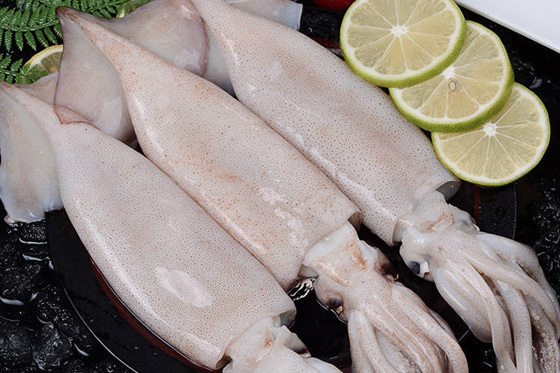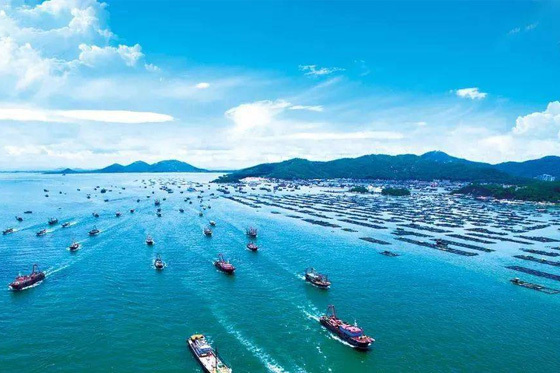NEWS
Sustainable utilization of resources - China continuously strengthens the management of deep-sea fisheries
2023-12-01
On the 24th, the State Council Information Office released a white paper entitled "Development of China's Oceangoing Fisheries", which comprehensively introduces the development concept, principle position, policy proposals, and performance of China's ocean going fisheries, shares China's experience in ocean going fisheries management, and promotes international cooperation and exchange in ocean going fisheries.
China is a major fishing country in the world. What are the development status, key regulatory measures, and effectiveness of China's ocean going fisheries? How to strengthen technological support? What contributions does China's ocean going fisheries make to the world's fisheries? The reporter interviewed relevant officials and experts to provide detailed explanations on issues of public concern.
China coordinates the promotion of resource conservation and sustainable utilization
The white paper points out that China adheres to the principle of protecting while developing and developing while protecting, implements important measures such as independent fishing bans in the high seas, continuously strengthens the conservation of fishery resources, strengthens ecosystem management, focuses on climate change and biodiversity conservation, and achieves significant results in promoting the long-term sustainable use of fishery resources.
"The Chinese government has taken stricter measures than regional fisheries management organizations," said Professor Liu Xiaobing from Shanghai Ocean University, citing that the Chinese government has decided that starting from 2024, all Chinese ocean going fishing vessels must submit electronic fishing logs on a daily basis. This measure is more stringent than the regional management measures in the annual fishing log reports of the Atlantic, Indian Ocean, and Eastern Pacific, which is conducive to obtaining real-time fishing vessel production information and timely understanding of fishing quotas/quota usage.
Chen Xinjun, Dean of the School of Ocean Science at Shanghai Ocean University, said that in order to ensure the sustainable utilization and scientific development of squid resources in the high seas, the Chinese government has implemented an independent fishing ban system for three international squid operating areas that are not managed by international organizations. This is a manifestation and responsibility of the Chinese government's responsible fishing.
It is understood that all high seas areas in China's offshore fishing operations that currently do not have regional fisheries management organizations have been included in the scope of autonomous fishing bans.
China strictly implements regulation of deep-sea fisheries and strengthens technological support for deep-sea fisheries
The sustained development of China's deep-sea fisheries is closely related to the strengthening of regulatory measures. The Chinese fishery regulatory authorities are continuously strengthening supervision, improving mechanisms, and enhancing capabilities to promote the sustainable and healthy development of deep-sea fisheries.
Zhang Xianliang, President of the China Ocean Fisheries Association, said that China has implemented the strictest global monitoring measures for the position of deep-sea fishing vessels; Starting from 2020, we will fully implement independent supervision of deep-sea fishery high sea transshipment, implement the procedures for early declaration and post reporting of all high sea transshipment activities, and gradually equip high sea transshipment transport ships with observers or install video surveillance systems; Strictly implement supervision over the import and export of aquatic products, and actively fulfill market country obligations; Establish a performance evaluation system for deep-sea fishery enterprises, implement strict supervision of their fishing activities, adhere to zero tolerance for violations, actively take legislative, administrative and other measures to combat illegal fishing, and regulate the production and operation activities of enterprises.
The white paper points out that China continuously strengthens scientific and technological innovation, promotes the improvement and efficiency of fisheries, transformation and upgrading, and high-quality development by conducting scientific surveys of high seas fisheries resources, participating in relevant research of regional fisheries management organizations, and improving and upgrading fishing vessels and equipment. The 14th Five Year Plan for National Fisheries Development proposes to increase the contribution rate of scientific and technological progress in fisheries from 63% in 2020 to 67% in 2025.
Chen Xinjun said that scientific research is the foundation of fishery management decision-making and fishery governance. China has conducted research on the assessment of high sea squid resources, the coverage rate of squid fishing observers, and the fishing effort of squid fishing, contributing Chinese wisdom and solutions to the governance of high sea fisheries.
"We will apply modern new technologies and achievements such as information technology and artificial intelligence to the management of high seas fisheries. We will develop and promote electronic fishing log systems." Chen Xinjun said that as of the end of 2022, more than 600 squid fishing vessels have installed and tested electronic fishing log systems, achieving real-time transmission of production data from the ocean to land, greatly improving compliance and timeliness; We have developed an electronic monitoring system and conducted ship side testing, laying the foundation for electronic observers to board deep-sea squid fishing boats.
Deepening International Fisheries Cooperation to Promote Sustainable Development of Global Fisheries
The development of China's fisheries has greatly promoted international exchanges and cooperation. According to statistics, the total import and export volume of China's aquatic products in 2022 was 10.23 million tons, with a total value of 46.7 billion US dollars. The total import and export volume reached a historic high, with more than 200 countries and regions engaged in aquatic trade.
The white paper states that during the 14th Five Year Plan period and in the coming period, China will continue to focus on promoting the agglomeration and development of the entire industry chain of deep-sea fisheries, improving the support system for the development of deep-sea fisheries, enhancing the comprehensive governance capacity of deep-sea fisheries, and increasing the guarantee for the development of deep-sea fisheries. Through optimizing the industrial structure, strengthening technological support, enhancing regulatory capabilities, deepening participation in international fisheries governance, and improving policy systems, Strive to achieve high-quality development of deep-sea fisheries.
Zhang Xianliang said that China's fishery development has made important contributions to the scientific conservation and sustainable utilization of global fishery resources. China actively develops aquaculture, while vigorously implementing the reduction of ships and production, fully implementing the total management system of marine fishery resources, achieving full coverage of the seven major inland river basins and four major sea areas, implementing the "ten-year fishing ban" on the Yangtze River, constructing marine pastures and aquatic conservation areas, conserving aquatic biological resources and ecosystems, protecting endangered species, and maintaining world aquatic biodiversity.
Zhang Xianliang said that after more than 30 years of development, China's deep-sea fisheries have achieved remarkable achievements. In the future, China's ocean going fisheries will continue to adhere to the path of green and sustainable development, optimize industrial structure, promote transformation and upgrading, improve quality and efficiency, strictly control development scale, strengthen standardized management, crack down on illegal fishing, and strive to scientifically conserve and sustainably utilize fishery resources, striving to achieve high-quality development of ocean going fisheries.
The Latest News
On the 24th, the State Council Information Office released a white paper entitled "Development of China's Oceangoing Fisheries", which comprehensively introduces the development concept, principle position, policy proposals, and performance of China's ocean going fisheries, shares China's experience in ocean going fisheries management, and promotes international cooperation and exchange in ocean going fisheries.
Argentine squid, also known as Argentine squid. Cephalopoda, family Cichlidae. The body is conical in shape. There is no membrane outside the orbit. The shallow hole in the front of the funnel-shaped depression does not have longitudinal folds and edge sacs, and is in a lubricating state.
What nutritional value does squid have?
Squid is a mollusk that lives in the ocean.In terms of taxonomy,squid belongs to the phylum Mollusca-cephalopoda-suborder Labroidei-order Decapoda.Squid has two gills inside as respiratory organs;
Questions? Contact Us
SAF Coolest v1.3.1.1 设置面板 ZSBSX-ZBVD-PQZWE-ZEQ
无数据提示
Sorry, the current column is being updated, please stay tuned!
You can view other sections or go back Home
V1.3.1 SVG图标库请自行添加图标,用div包起来,并命名使用
右侧在线客服组件







